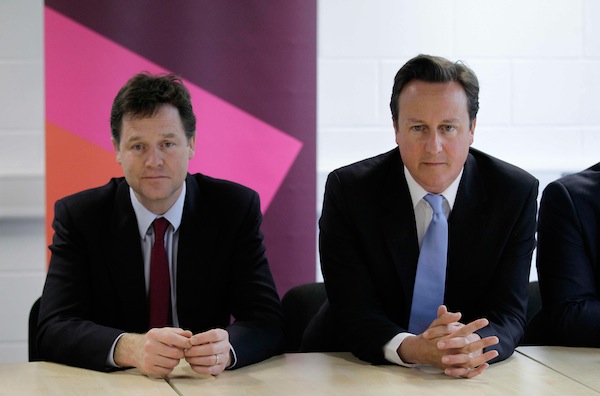The tensions undermining a pact
written for The Spectator, 14 September 2010

(Photo by Matt Dunham – WPA Pool/Getty Images)
The announcement, yesterday, of Nick Boles’ proposal for a Lib-Con electoral pact conveniently coincided with the opening of an election court hearing into a particularly unpleasant battle between former Labour minister Phil Woolas and his Lib Dem opponent, Councillor Elwyn Watkins. The most serious allegations against Mr Woolas, who won the seat with a 103 vote majority at the last general election, are that he deliberately lied in accusing Mr Watkins of being “in league with extremist Muslims … and prepared to condone death threats against Mr Woolas,” and that in election pamphlets he falsely accused Mr Watkins of receiving funding from abroad. There will, no doubt, be some in the coalition who hope that coverage of this particular Lab-Lib hurly-burly reminds many in the Lib Dem rank and file of their own run-ins with local Labour parties – or at least reinforces the message that the Labour party has been as much the enemy in recent elections as the Conservatives. The Boles proposal comes in a month when it is particularly important for the Coalition to float new ideas to the Lib Dem grassroots in the gentlest possible terms. As Michael Brown points out in The Independent, it would be embarrassing if the proposal became a focus of dissent at next week’s Lib Dem party conference, where any such pact “would be blown a raspberry by party members, were it on next week’s conference agenda”.
But the rancour of the Woolas case cannot disguise the fact that many of the most bitter and high profile battles of the last election were between Lib Dem and Conservative candidates. Many of the combatants will be hungry for revenge. Dr Evan Harris, the secularist and campaigner for scientific causes, lost the seat of Oxford West and Abingdon to Nicola Blackwood, a member of an Evangelical church. Both candidates were subject to fierce attacks – Evan Harris was nicknamed “Dr Death” by a number of commentators, including two local activists unaffiliated with Ms Blackwood, who in return was accused of fundamentalism and smear tactics. Dr Harris has already declared his intention to reclaim the seat he held for thirteen years. Would he freeze his campaign at an order from HQ, and in spite of the support and encouragement of such high profile rationalists as Richard Dawkins, Simon Singh and Ben Goldacre? Dr Evans was unavailable for comment yesterday, but it seems unlikely.
Other particularly acrimonious campaigns include Richmond, where the Lib Dems were furious to lose the seat to Zac Goldsmith, who is now embroiled in a public row with Channel 4 over his expenses; Chippenham, where the losing Conservative candidate Wilfred Emmanuel Jones implied that his opponents had been using “not local” as euphemism for ‘black”; and Sutton and Cheam, where Phillippa Stroud’s attempt to unseat Paul Burstow was derailed by a series of unproven allegations that she was involved in homophobic churches. It will take a lot more than the Phil Woolas case for both Conservative and Lib Dem activists in these seats to be convinced that Labour are now the local enemy – particularly if they have previous grounds to distrust cross-party deals.
Michael Brown points out that, “it impossible for Tories to oppose Nick Clegg next time in his Sheffield constituency on the basis that his record, and that of his party, will have been dreadful between 2010 and 2015.” But Clegg has been the face of the coalition, and there are unlikely to be many backbenchers who are comparable ease with their coalition colleagues. It is possible that a deal could be struck for Government ministers to be given a clear run at Labour, while backbenchers could fight over their turf. There would still be plenty of problems – the deal would have to be sold to backbenchers as a guarantee of their right to independence, rather than as preferential treatment for ministers. As Paul Goodman notes, any such deal would involve major negotiations over constituencies with new boundaries, and unless it included Labour-held seats, it “won’t win the Coalition a single extra seat”. But it would avoid the problem of coalition partners having to attack each other’s record in government.




